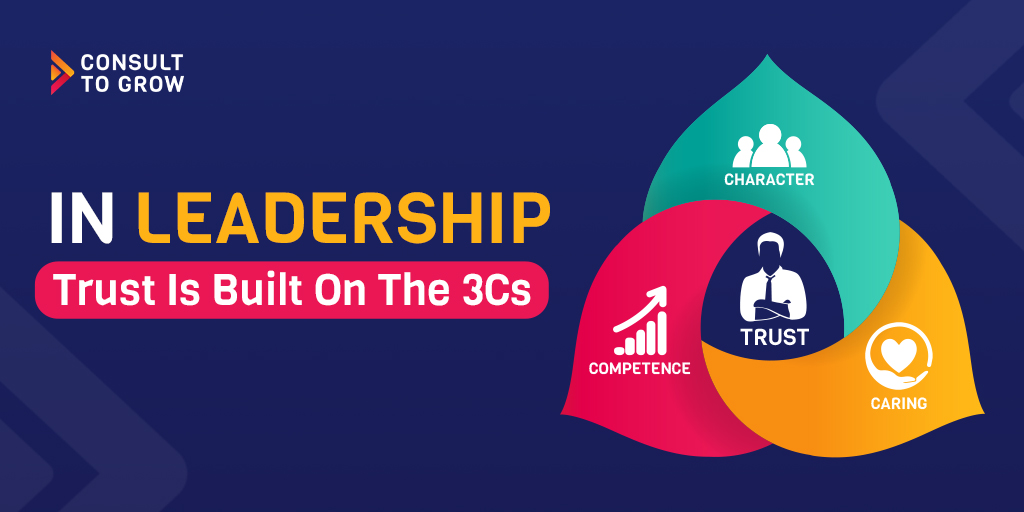
From Chaos to Cooperation: A New Manager’s Guide to Inheriting a Messy Team
Stepping into a leadership role can be exciting, but what if the team you inherit is a complete mess? You didn’t make the mess, but

Trust isn’t automatic. It’s intentional—it needs to be consciously built and nurtured. When it comes to your business, that means establishing systems and processes that uphold your vision, mission, and values for and by your team. Trust starts from the top. Without it, team members disconnect, disengage, and have no reason to contribute fully. With trust, teams collaborate, innovation happens, and your business achieves long-term success. In short, trust is the foundation of strong leadership and a thriving business. If you want to lead your business with strength and integrity into a flourishing future, you need to start and end with trust.
In leadership, trust is built on three core elements–the 3 C’s. These were established by Patrick Sweeney, a researcher in military psychology during the invasion of Iraq in 2003. Through surveys administered to officers, non-commissioned officers, and enlisted soldiers, Sweeney discovered three key factors necessary for soldiers to trust their leaders.
These factors extend well beyond military application, and that’s because many jobs are stressful, demanding, and important. Consider this: Would you want to work for someone who wasn’t clear on their why? Who didn’t treat you or your team members fairly? Or who didn’t seem to care about you beyond what you can do for them? We all want to feel valued, appreciated and secure. The 3 C’s reinforce that, and in doing so, establish the bond of trust.

Building a working culture of trust requires daily action and commitment. You can’t reach out a hand and ask, “Do you trust me?” While some team members may take the leap, what you need to ensure is that their trust is not misplaced. You can make trust the backbone of your workplace by looking deeply into your business vision and practices in order to incorporate the following:
Openness fosters trust. Share company goals, updates, and challenges honestly. When team members understand the bigger picture, they feel more valued and engaged.
Encourage team members to share their thoughts and ideas. More importantly, act on their feedback when possible—this shows that their voices matter.
Trust your team to do their jobs without constant oversight. Give them autonomy, and they’ll take ownership of their work and perform better. Part of this is leading by example: Your behavior sets the tone. Show up with integrity, keep your promises, and demonstrate the work ethic and values you expect from your team.
Appreciation builds trust. Acknowledge great work publicly and provide meaningful rewards for effort and achievement. Not sure what this can look like? Read our post on Employee Recognition Ideas to Fire Up Culture and check out our Total Rewards tools.
Respect your employees’ time. Encourage healthy boundaries, flexible work arrangements, and time off to prevent burnout and build a sustainable, trust-based culture. Team members are more than their job titles. This means part of work-life balance is supporting career growth, mental health, and well-being to create a workplace where they feel seen and supported. An Individualized Development Plan is a great place to start. If this is not already a practice in your business, we offer a template and guide that works for any business model to get you started.

What you’ll find is when trust is embedded in your company’s culture, the benefits will be undeniable. Imagine walking into a workplace where your team members are happy to show up. How often have you experienced that? When that is the case, your company will experience:
Trust isn’t just a feel-good concept—it’s a business necessity. Companies that prioritize trust experience stronger teams, greater innovation, and long-term success. Remember: As a leader, your actions set the stage. By demonstrating competence, character, and care, and by implementing trust-building practices, you can create an environment where employees thrive—and where your business flourishes.
Consult to Grow® provides various tools and services to help you develop people strategies. We can expertly assess your HR infrastructure, develop custom Employer of Choice strategies, facilitate leadership meetings and retreats, help you design bonus and incentive programs, and design managing partner programs. Ready to get started?

Stepping into a leadership role can be exciting, but what if the team you inherit is a complete mess? You didn’t make the mess, but

What Is a Quarterly Business Review (QBR) & Why Does Your Business Need One? Running a business is demanding. As a business owner or founder,

Owning multiple locations is often the most exciting milestone for a restaurant or retail owner, but it also comes with unique challenges. This post is